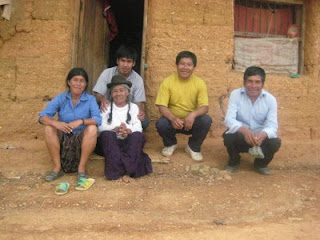Edwin and I started our journey together early Saturday morning in La Paz. Our bus, filled primarily with jovial Apoleños headed back to their hometown to celebrate the town's annual festival on December 8th, left the city promptly at 7am. As we made our way across the brown, barren altiplano, passing the infamous Lago Titicaca, the woman across the aisle cried out what was to be the first of many hometown anthems: Apolo, Apolo...te doy mi corazón! (Apolo, Apolo...I give you my heart!)
By noon, the sun had made way for cold, misty weather and I woke up from a nap to see alpacas grazing the rocky countryside, fearlessly walking across the road in front of our bus.
After a brief bathroom stop in Charazani (elevation 10,000 feet, mas o menos) the road started to drop and we entered greener and, more importantly, warmer, territory. Edwin, ever the agronomist, was quick to point out plants, animals, and points of interest along the way. From the window, he took pictures of waterfalls and the mountain scenery.

A photo Edwin snapped from the window of the bus--about 4 hours away from Apolo and about 45 minutes before our flat tire.
Originally, he had told me that Apolo was about 12 hours from La Paz by bus. But, due to some technical glitches (i.e. flat tire and no gas) and the fact that the bus moved at, according to Edwin, "a turtle's pace," we didn't arrive to the main plaza until 10:30pm--more than 15 hours after leaving Bolivia's capital city.
Anxious to be off the bus, we gathered our things, exited the flota, and walked to the outskirts of town. In the dark, we made our way to Edwin's family's house where his parents, worried that we had not arrived sooner, anxiously awaited our arrival.
Immediately, I felt welcomed and at home in their casa. Edwin's mom quickly made us something to eat--she fried up yucca and the UAC-CP smoked sausages that had survived the journey with us to Apolo. By the light of a lone light bulb that dangled from the ceiling of what was to be my bedroom for the next three days, the four of us sat and talked--primarily about education. Because neither of his parents have had the opportunity to visit the College, they asked about their son's studies.
Edwin pictured on Sunday morning with (from L to R) his mother, paternal grandmother, uncle, and father.
"You told them, right?" I asked Edwin. "About yesterday?" Edwin shook his head no and I gave him a disgruntled look that prodded him to share his exciting news. Sheepishly, he admitted that the day before he had defended his thesis pre-defense, one of the final steps to officially graduating from the UAC-CP. His parents beamed; they immediately wanted to know when he would graduate. Probably February or March, Edwin told them.
"We never thought a poor family like us," Edwin's dad said, "would have a son who would graduate from college." Edwin's mother said she just couldn't believe it.
"Well, believe it," I said, smiling at Edwin as he washed down his yucca with a glass full of guarapo, the traditional Apoleño sugar cane drink. "The next time he comes home to Apolo, he'll be Ingenerio Edwin Zapata."


















